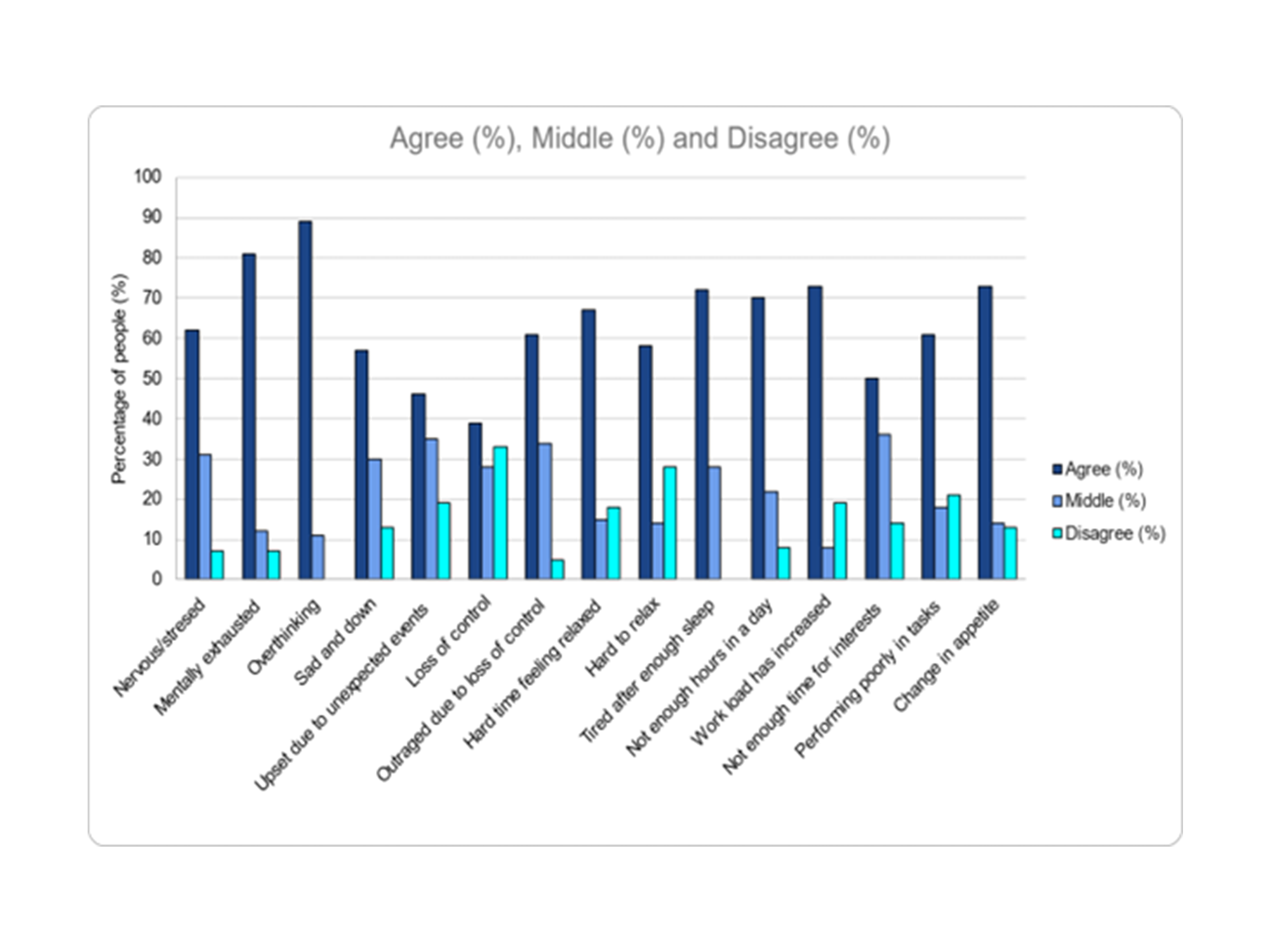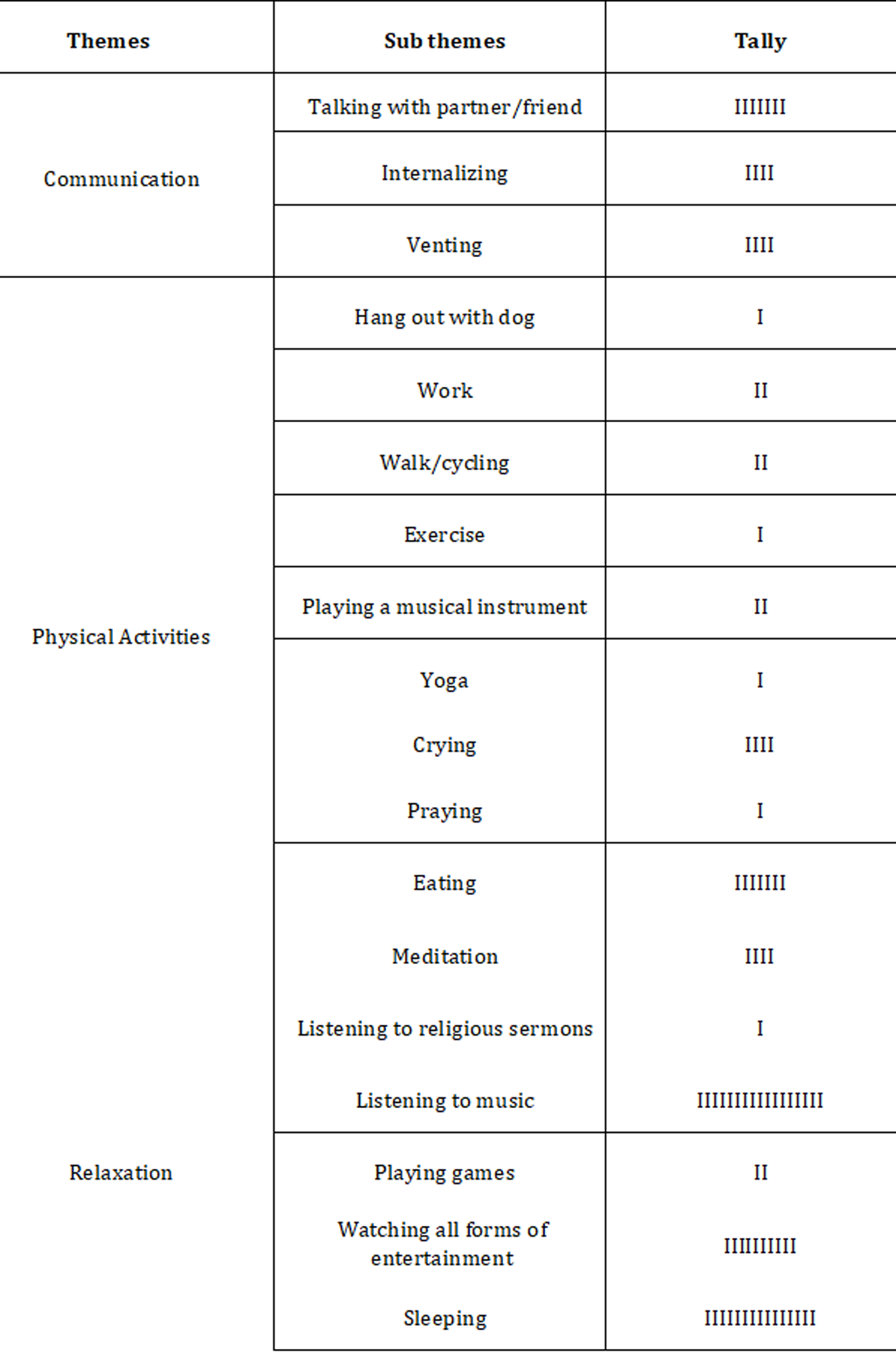Stress Psychology Report

Abstract
The aim of this study is to get a better understanding of the stress levels during this current COVID-19 pandemic. Volunteer sampling was used in the study to gather data from questionnaires that were distributed among friends and family members. Higher stress levels were obtained from the results of the study therefore, it can be concluded that stress levels have risen during the current COVID-19 pandemic. Further measures can also be taken in the future to ensure that the study can be improved and allows for easy replication.
Introduction
Coronavirus Disease (COVID-19) is an infectious disease that was declared a global pandemic by the World Health Organization (WHO) in March 2020, resulting in a lockdown in an attempt to prevent and slow the spread of the virus. Stress is a feeling of emotional or physical tension that comes from any event or thought that can make you feel frustrated, angry, or nervous and is our body’s reaction to a challenge or demand. The COVID-19 pandemic has impacted lives globally where people are facing challenges that can be stressful and overwhelming. Public health actions, such as social distancing, are necessary to reduce the spread of COVID-19, but they can make us feel isolated and lonely and can increase stress and anxiety. Emerging findings from China suggested that more than 25% of the general population experienced moderate to severe levels of stress symptoms in response to COVID-19 (Qiu et al., 2020; Wang et al., 2020). These findings are similar to those reported during the SARS outbreak (Cheng, Wong, Tsang, & Wong, 2004) and in the 2009 H1N1 pandemic (Rubin, Amlôt, Page, & Wessely, 2009; Wheaton, Abramowitz, Berman, Fabricant, & Olatunji, 2012). Therefore, it is hypothesized that stress levels have risen further during the current COVID-19 pandemic.
Methodology
The data from the questionnaires were gathered from the 15th of September to the 21st of September from 74 participants living in Sri Lanka which consisted of males, 38%, and females, 62%. The participants included friends and family members from the ages of 11 to 64 years from various backgrounds who were recruited through volunteer sampling. This COVID-19 pandemic resulted in a nationwide lockdown which forced people to switch to online platforms, therefore the questionnaire was distributed through WhatsApp.
Discussion
Informed consent was obtained from each participant prior to participating in the study where they were fully informed about the aims of the study and about the confidentiality of the data. The findings obtained from the questionnaire remained private and confidential and were used only for the purpose of the research. Further, the same questionnaire was distributed to everyone therefore, it is a highly standardized procedure. As a result, it is highly replicable, and reliable results can be obtained. Furthermore, the study is high in diversity as the participants come from various backgrounds. The study was approved by the Psychology teacher of the Royal Institute International School of Nugegoda. However, there are some factors that must be considered. The target population of the study consisted of participants only from the ages of 11 – 64 and therefore, lacked generalisability in terms of ages above 64. The findings were limited to close friends and family and people within Colombo. Therefore, the findings cannot be generalized to the other districts in Sri Lanka. There was an uneven ratio of males and females who participated in the study with males, 38%, and females, 62% while the general population of Sri Lanka consists of males, 49.3%, and females, 50.7%.
Findings
TABLE 1
| Agree (%) | Middle (%) | Disagree (%) | |
| Nervous/stressed | 62 | 31 | 7 |
| Mentally exhausted | 81 | 12 | 7 |
| Overthinking | 89 | 11 | – |
| Sad and down | 57 | 30 | 13 |
| Upset due to unexpected events | 46 | 35 | 19 |
| Loss of control | 39 | 28 | 33 |
| Outraged due to loss of control | 61 | 34 | 5 |
| Hard time feeling relaxed | 67 | 15 | 18 |
| Hard to relax | 58 | 14 | 28 |
| Tired after enough sleep | 72 | 28 | – |
| Not enough hours in a day | 70 | 22 | 8 |
| Workload has increased | 73 | 8 | 19 |
| Not enough time for interests | 50 | 36 | 14 |
| Performing poorly in tasks | 61 | 18 | 21 |
| Change in appetite | 73 | 14 | 13 |
FIGURE 1

Table 1 shows the percentage of participants who agreed, disagreed and neither agreed nor disagreed to the questions and statements given in the questionnaire, while figure 1 shows the graphical representation of the percentages of the results received from the questionnaire. Inspection of Figure 1 suggests that 46 out of 74 participants (62%) have been nervous or stressed during the COVID-19 pandemic while only 5 out of 74 participants (7%) claimed to have not been nervous or stressed. There also appears to be a large percentage, 73% (53 out of 74), who stated that the workload has increased while only 19% (15 out of 74) disagreed that the workload hasn’t increased.
Further, exactly 50% of the participants claimed that they don’t have enough time for their interests and hobbies outside of work while 70% of the participants (52 out of 74) claimed that they find themselves not having enough hours in a day to complete all the work they have. Furthermore, it has also been identified that 60 out of 74 participants (81%) stated that they have been feeling mentally exhausted while only 5 out of 74 participants (7%) disagreed that they haven’t been feeling mentally exhausted. Moreover, a total of 54 out of 74 participants (73%) agreed that their appetite has changed during the past month while only 10 out of 74 participants (14%) disagreed that there weren’t any changes in their appetite. It has also been seen that 71% (53 out of 74) claimed that they feel tired even after an adequate amount of sleep while only
28% (21 out of 74) claimed that they don’t feel tired even after an adequate amount of sleep. A high amount of 66 out of 74 participants (89%) strongly agreed that they feel like they overthink things while only a less amount of 8 out of 74 participants (11%) disagreed that they overthink things.
THEMATIC ANALYSIS

Conclusion
It can be concluded from the results obtained (see page 4), that high-stress levels were perceived during the current COVID-19 pandemic and the hypothesis (see page 2) stating that stress levels have rapidly risen during the current COVID-19 pandemic can be accepted.
Recommendations
A sample with participants from all the districts in the country needs to be obtained with participants from a wider age range to improve the generalisability of the findings further. Participants need to be reminded of their right to withdraw from the study at any time without having to face any consequences, as to improve the study more ethically and to protect the autonomy of the participants. Stratified sampling can be used when gathering participants so that the general population will be accurately reflected in the study, which will make the study more precise.


